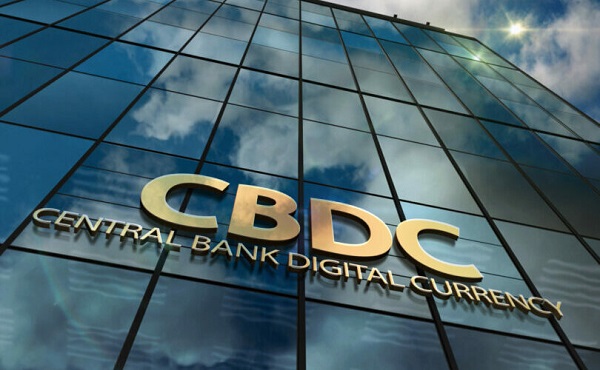Banks
International Monetary Fund paper suggests CBDCs could turn society cashless

From LifeSiteNews
A working paper by the International Monetary Fund suggests that cash may disappear from society entirely once central bank digital currencies become mainstream.
Digital currencies like CBDCs could make cash extinct, whether by design or through market preference, according to an IMF working paper.
With widespread digital currency adoption, cash may go the way of the dodo bird, and it would be “challenging and costly” to revive it if a society were to go fully cashless, according to the IMF working paper, Could Digital Currencies Lead to the Disappearance of Cash from the Market? by Marco Pani and Rodolfo Maino.
The disappearance of cash, according to the authors, could come about either through direct policy or as a natural part of innovation and digital currency adoption.
They say that “the introduction of a DC [Digital Currency] in a diverse payment ecosystem—comprising cash, traditional payment cards, and modern electronic money—where the use of physical cash has already declined significantly, could lead to the complete disappearance of cash, even if such an outcome were not an intentional policy objective.”
READ: Financial expert warns all-digital monetary system would enable ‘complete control’ of citizens
The authors looked at how merchants and customers use physical cash and cards, and simulated how the introduction of digital currencies could either complement cash and cards or wipe them out completely.
According to the report, the introduction of a new currency can alter the market equilibrium in several qualitatively different ways:
- It may displace one of the exiting currencies (either cash or cards);
- It may replace both currencies; or
- It may continue to be used indefinitely alongside the other two currencies.
"You could have a potentially […] darker world where the government decides that [CBDC] can be used to purchase some things, but not other things that it deems less desirable like say ammunition, or drugs, or pornography, or something of the sort": Eswar Prasad, WEF #AMNC23 pic.twitter.com/KkWgaEWAR5
— Tim Hinchliffe (@TimHinchliffe) June 28, 2023
Programmable digital currencies like Central Bank Digital Currencies (CBDCs) cannot operate without pegging every user to a digital identity.
What’s more, these programmable digital currencies can be controlled remotely, so that taxes and fines could automatically be taken out of accounts, or so that restrictions could be placed on what you could buy, where you could buy it and when.
Last year, the IMF published a policy brief acknowledging that CBDCs could be used for state surveillance while posing risks to privacy and cybersecurity that could undermine trust in central bank money.
According to the November 2024 IMF brief, Central Bank Digital Currency: Progress And Further Considerations:
CBDC, as a digital form of central bank money, may allow for a ‘digital trail’—data—to be accessed, collected, processed and stored.
In contrast to cash, CBDC could be designed to potentially include a wealth of personal data encapsulating transaction histories, user demographics, and behavioral patterns.
Personal data could establish a link between counterparty identities and transactions.
While the IMF acknowledges the risks to privacy, the potential for government surveillance, and how public and private entities could leverage user data for nefarious means, it is still plowing ahead with a CBDC Handbook for central banks and governments to follow during their rollouts.
READ: International Monetary Fund ‘working hard’ on a global Central Bank Digital Currency platform
The IMF consistently says that digital currencies should be complementary to physical cash and to not replace it, but all signs point towards the erosion of cash over time, whether through convenience or coercion — carrot or stick.
Speaking at the World Economic Forum’s (WEF) Special Meeting on Global Collaboration, Growth and Energy Development last year, Central Bank of Bahrain governor Khalid Humaidan told the panel “Open Forum: The Digital Currencies’ Opportunity in the Middle East” that one of the goals of CBDC was to replace cash, at least in Bahrain, and to go “one hundred percent digital.”
"We're probably going to stop calling it central bank digital currency [CBDC]. It's going to be a digital form of cash, and at some point in time hopefully we will be able to be 100% digital": Central Bank of Bahrain Governor Khalid Humaidan to the WEF https://t.co/Pspr0M1Uuq pic.twitter.com/N5aOkCpzh1
— Tim Hinchliffe (@TimHinchliffe) April 29, 2024
“If we think cash is the analogue and digital currency is the form of digital — CBDC is the digital form of cash — today, clearly we’re in a hybrid situation; we’re using both,” said Humaidan.
We know in the past when it comes to cash, central bankers were very much in control with all aspects of cash, and now we’re comfortable to the point where the private sector plays a big role in the printing of the cash, in the distribution of the cash, and with the private sector we use interest rates to manage the supply of cash.
The same thing is likely to happen with CBDC. Yes, the central bank will have a role, but at some point in time — the same way we don’t call it ‘central bank cash’ — we’re probably going to stop calling it central bank digital currency.
It’s going to be a digital form of the cash, and at some point in time hopefully we will be able to be one hundred percent digital.
"Is it [digital euro] going to be as private as cash? No. A digital currency will never be as anonymous and as protecting of privacy in many respects as cash, which is why cash will always be around": Christine Lagarde, BIS Innovation Summit, March 2023 #CBDC pic.twitter.com/BLMVOPax6a
— Tim Hinchliffe (@TimHinchliffe) April 11, 2023
While the IMF advises to not eliminate cash altogether, central banks and governments are already moving in that direction.
Furthermore, a WEF Agenda blog post from September, 2017 lists the “gradual obsolescence of paper currency” as being “characteristic of a well-designed CBDC.”
If cash were to go extinct, the latest IMF working paper warns, “reintroducing cash in a non-cash system would be challenging and costly.”
Therefore, the authors conclude:
To safeguard the continued utilization of cash and to uphold the equilibrium of the payment system, the study advocates for a proactive policy approach and for the implementation of measures aimed at ensuring the sustained relevance of physical currency, especially in scenarios where the introduction of new digital currencies might inadvertently lead to the extinction of traditional cash.
The IMF working paper Could Digital Currencies Lead to the Disappearance of Cash from the Market? was published on the IMF website in March 2025; however, the paper was first published in the International Advances in Economic Research journal on February 19, 2024 under its original title, Could CBDCs Lead to Cash Extinction? Insights from a ‘Merchant-Customer’ Model.
Reprinted with permission from The Sociable.
Note from LifeSiteNews co-founder Steve Jalsevac: This article is a must-read and view for all readers because of the profound personal impact a digital economy would have on every individual and every family.
The great Catherine Austin Fitts has strongly recommended that every citizen use cash as much as possible for purchases. She says that if millions did this, it would delay, if not stop, a forced digital economy. She should know. Fitts emphasizes, “In a highly leveraged financial system such as we have, a single individual counts for a lot.”
See her article, I Want to Stop CBDCs – What Can I Do
The increased use of credit and debit cards, including phone and other digital payment systems, is tempting because of their convenience. Still, it is also your cooperation in building your economic prison and total control of all that you say and do, where and when you travel, what you buy or subscribe to, and so on. We are facing a totalitarian control that has never before been experienced in human history. It is beyond frightening.
Carrying and using cash for purchases, and refusing to purchase anything from shops, restaurants or other services that do not accept cash or checks, is inconvenient and requires a little effort, commitment and some degree of courage.
Banks
Canada Pension Plan becomes latest institution to drop carbon ‘net zero’ target

From LifeSiteNews
Changes to the law require companies to more rigorously prove their environmental claims.
The investment group in charge of Canada’s governmental pension plan has ditched its “net zero” mandate, joining a growing list of major institutions doing the same.
According to the Canada Pension Plan (CPP) Investments’ latest annual report, the entity is no longer committed to carbon “net-zero” by 2050. The CPP’s ditching of the target comes after a number of major institutions, including the Royal Bank of Canada (RBC), Toronto-Dominion Bank (TD), Bank of Montreal (BMO), National Bank of Canada, and the Canadian Imperial Bank of Commerce (CIBC), all made similar moves in recent months.
While ditching the net-zero effort, chief executive of CPP Investments John Graham maintained that it is still “really important to incorporate climate and incorporate sustainability” in its long-term investment portfolio.
The dropping of the “climate” target comes as recent changes to Canada’s Competition Act now mandate that companies prove any environmental claims they make, with Graham insinuating these changes were a factor in the decision.
“Recent legal developments in Canada have introduced, kind of, new considerations around how net-zero commitments are interpreted, so that’s caused us to change a little bit how we talk about it, but nothing’s changed on what we’re actually doing.”
Over the past decade, left-wing activists have used “net zero” and “environmental, social & governance” (ESG) standards to encourage major Canadian and U.S. corporations to take particular stands on political and cultural issues, notably in promotion of homosexuality, transgenderism, race relations, the environment, and abortion.
Outside of Canada, many major corporations have announced they are walking back DEI and other related policies. Some of the most notable include Lowe’s, Jack Daniel’s, and Harley Davidson. Other companies such as Disney, Target, and Bud Light have faced negative sales due to consumers fighting back and refusing to patronize the businesses.
Since taking power in 2015, the Liberal government, first under Justin Trudeau and now under Mark Carney, has continued to push a radical environmental agenda in line with those promoted by the World Economic Forum’s “Great Reset” and the United Nations’ “Sustainable Development Goals.” Part of this push includes the promotion of so called net-zero energy by as early as 2035.
Alberta
SERIOUS AND RECKLESS IMPLICATIONS: An Obscure Bill Could Present Material Challenge for Canada’s Oil and Gas Sector

From Energy Now
By Tammy Nemeth and Ron Wallace
Bill S-243 seeks to “reshape the logic of capital markets” by mandating that all federally regulated financial institutions, banks, pension funds, insurance companies and federal financial Crown Corporations align their investment portfolios with Canada’s climate commitments
Senator Rosa Galvez’s recent op-ed in the National Observer champions the reintroduction of her Climate-Aligned Finance Act (Bill S-243) as a cornerstone for an “orderly transition” to achieving a low-carbon Canadian economy. With Prime Minister Mark Carney—a global figure in sustainable finance—at the helm, Senator Galvez believes Canada has a “golden opportunity” to lead on climate-aligned finance. However, a closer examination of Bill S-243 reveals a troubling agenda that potentially risks not only crippling Canada’s oil and gas sector and undermining economic stability, but one that could impose unhelpful, discriminatory measures. As Carney pledges to transform Canada’s economy, this legislation would also erode the principles of fairness in our economic and financial system.
Introduced in 2022, Bill S-243 seeks to “reshape the logic of capital markets” by mandating that all federally regulated financial institutions, banks, pension funds, insurance companies and federal financial Crown Corporations align their investment portfolios with Canada’s climate commitments, particularly with the Paris Agreement’s goal of limiting global warming to 1.5°C. The Bill’s provisions are sweeping and punitive, targeting emissions-intensive sectors like oil and gas with what could only be described as an unprecedented regulatory overreach. It requires institutions to avoid financing “new fossil fuel supply infrastructure” and to plan for a “fossil-free future,” effectively discouraging investment in Canada’s energy sector. To that end, it imposes capital-risk weights of 1,250% on debt for new fossil fuel projects and 150% or more for existing ones, making such financing prohibitively expensive. These measures, as confirmed by the Canadian Bankers’ Association and the Office of the Superintendent of Financial Institutions in 2023 Senate testimony, would have the effect of forcing Canadian financial institutions to exit oil and gas financing altogether. It also enshrines into law that entities put climate commitments ahead of fiduciary duty:
“The persons for whom a duty is established under subsection (1) [alignment with climate commitments] must give precedence to that duty over all other duties and obligations of office, and, for that purpose, ensuring the entity is in alignment with climate commitments is deemed to be a superseding matter of public interest.”
While the applicability of the term used in the legislation that defines a “reporting entity” may be a subject of some debate, the legislation would nonetheless direct financial institutions to put “climate over people”.

There are significant implications here for the Canadian oil and gas sector. This backbone of the economy employs thousands and generates billions in revenue. Yet, under Bill S-243, financial institutions would effectively be directed to divest from those companies if not the entire sector. How can Canada become an “energy superpower” if its financial system is directed to effectively abandon the conventional energy sector?
Delivered to You: It’s Free! Sign Up for the EnergyNow Canadian Energy Focused Newsletter Here
Delivered to You: It’s Free! Sign Up for the EnergyNow US Energy Focused Newsletter Here
Beyond economics, Bill S-243 raises profound ethical concerns, particularly with its boardroom provisions. At least one board member of every federally regulated financial institution must have “climate expertise”; excluded from serving as a director would be anyone who has worked for, lobbied or held shares in a fossil fuel company unless their position in the fossil fuel company was to help it align with climate commitments defined in part as “planning for a fossil fuel–free future.” How is “climate expertise” defined? The proposed legislation says it “means a person with demonstrable experience in proposing or implementing climate actions” or, among other characteristics, any person “who has acute lived experience related to the physical or economic damages of climate change.” Bill S-243’s ideological exclusion of oil and gas-affiliated individuals from the boards of financial institutions would set a dangerous precedent that risks normalizing discrimination under the guise of environmental progress to diminish executive expertise, individual rights and the interests of shareholders.
Mark Carney’s leadership adds complexity to this debate. As the founder of the Glasgow Financial Alliance for Net Zero, Carney has long advocated for climate risk integration in finance, despite growing corporate withdrawal from the initiative. Indeed, when called to testify on Bill S-243 in May 2024, Carney praised Senator Galvez’s initiative and generally supported the bill stating: “Certain aspects of the proposed law are definitely achievable and actually essential.” If Carney’s Liberal government embraces Bill S-243, or something similar, it would send a major negative signal to the Canadian energy sector, especially at a time of strained Federal-Provincial relations and as the Trump Administration pivots away from climate-related regulation.
Canada’s economy and energy future faces a pivotal moment. Bill S-243 is punitive, discriminatory and economically reckless while threatening the economic resilience that the Prime Minister claims to champion. A more balanced strategy, one that supports innovation without effectively dismantling the financial underpinnings of a vital industry, is essential. What remains to be seen is will this federal government prioritize economic stability and regulatory fairness over ideological climate zeal?
Tammy Nemeth is a U.K.-based energy analyst. Ron Wallace is a Calgary-based energy analyst and former Permanent Member of the National Energy Board.
-

 Addictions2 days ago
Addictions2 days agoSaskatchewan launches small fleet of wellness buses to expand addictions care
-

 Business2 days ago
Business2 days agoGovernments must work to improve Canadian living standards despite recent good news
-

 Business2 days ago
Business2 days agoRemoving barriers to trade between Alberta and the rest of Canada could grow our economy by $72.1 billion, says the MEI
-

 Automotive13 hours ago
Automotive13 hours agoCanada’s EV house of cards is close to collapsing
-

 Business1 day ago
Business1 day agoOil producers brace for market share battle
-

 COVID-191 day ago
COVID-191 day agoApproval of new COVID-19 vaccine dashes hopes Trump admin would close the book on controversial shots
-

 Business24 hours ago
Business24 hours agoOttawa must listen to the West
-

 Business15 hours ago
Business15 hours agoSobering reality check – Trump is right: Canada’s economy can’t survive a fair trade agreement with the US






